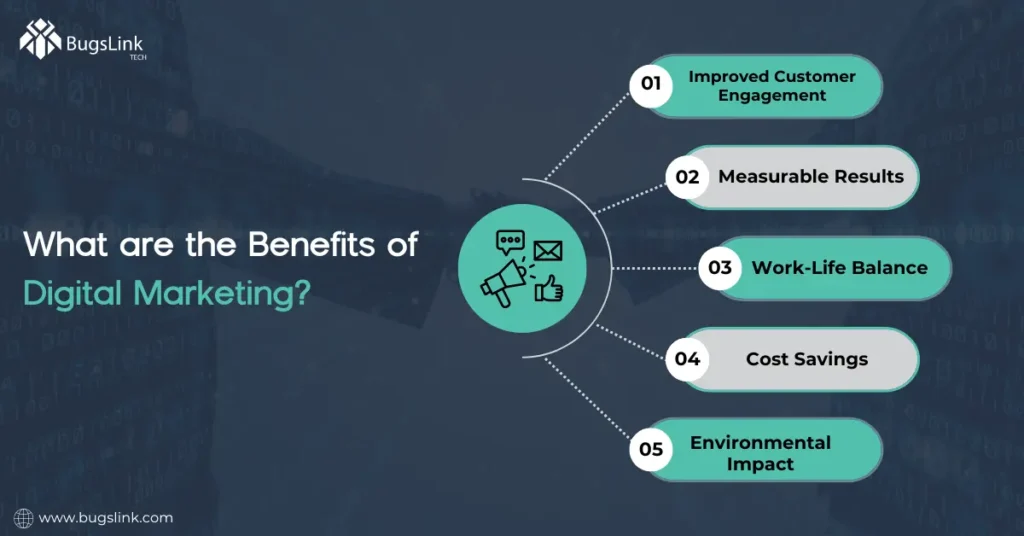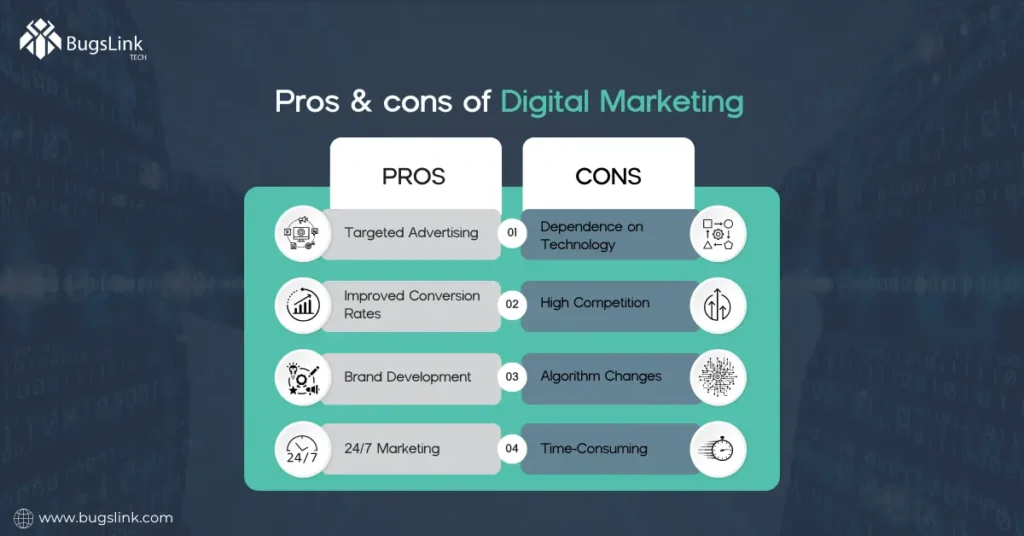Digital marketing has become a paramount medium for business growth as it offers multiple advantages. Digital marketing services help small businesses effectively understand crucial consumer preferences and optimizations, which is why a data analytical approach ensures maximum return on investment. Small companies always desire digital marketing services to grow competitively in this ever-evolving digital world. This blog post intends to explore the 5 Reasons Why Digital Marketing is Important for Small Businesses and the pros and cons of digital marketing.
What is Digital Marketing?
All marketing actions that employ an electronic device or the Internet are named digital marketing. Businesses use different social media platforms to connect with potential customers. Search Engine Optimization (SEO), content marketing, social media marketing, and email marketing are considered as essential and crucial elements of digital marketing. If you are still looking for the best marketers in the world, then visit Bugslink tech’s marketing services.
5 Reasons Why Digital Marketing is Important for Small Business

With a complete digital marketing plan, small businesses significantly expand and improve their performance, which makes their survival possible in this competitive environment.
Here are the benefits and reasons why digital marketing is essential for small businesses:
Cost-Effective:
Digital marketing is way cheaper than conventional marketing approaches. Traditional advertising is only feasible for some businesses. On the other hand, digital marketing offers budget-friendly marketing opportunities, like pay-per-click (PPC) campaigns, social media promotion, and email marketing. These techniques enable businesses to reach many potential audiences at low investment costs. Digital marketing service providers offer low-investment marketing suggestions and strategies that allow small business owners to spend their marketing budget more effectively by reaching people more likely to be interested in your products or services.
Measurable Results:
Digital marketing is capable of analyzing and evaluating your business’s performance. These analytics tools and platforms like Google Analytics, social media insights, and email marketing software offer comprehensive data on the effectiveness of your initiatives. Metrics, including website traffic, conversion, click-through, and consumer involvement, are readily apparent. This data analytical strategy enables companies to identify a range of satisfactions or likeliness in the audience. It helps them to decide on optimizing and effective marketing plans for the best outcomes.
Wide Reach:
Internet availability makes it seamlessly possible to reach out to a global audience, even for small businesses. All enterprises now have a formerly unheard-of chance to be seen worldwide. Conventional marketing is sometimes limited to local or regional audiences. Recent marketing entails Search engine optimization (SEO), content marketing, and social media that increase brand exposure and leads, and, eventually, more sales can all result from this wider reach.
Improved Customer Engagement:
Digital marketing platforms directly interact with potential audiences, facilitating engagement and building relationships. The social media platform’s comment section enables us to directly get the audience’s feedback and engage your customers by responding to their comments, answering questions, and participating in conversations. For instance, Email marketing offers more personalized communication, making customers feel valued and appreciated. Content marketing, such as blog posts and videos, provides valuable information to your audience and makes your business trustworthy. It seamlessly increases engagement, helps build brand loyalty, and can lead to repeat business and referrals.
Competitive Edge:
Stands out in competitiveness of today’s digital world entirely depends on your online visibility. Buyers hunt for goods and services online, deciding what to buy and from where to buy. Small businesses only compete with larger enterprises or established brands by more effectively using digital marketing techniques and need help to increase their online credibility and visibility. Effective digital marketing will help you to stand before competitors, expand your business, and build your brand as an industry leader.
Challenges For Small Businesses:
- Limited Budgets and resources are significant issues for small businesses that make investing in digital marketing approaches challenging.
- Digital marketing trends are constantly changing and need continuous adaptation.
- Managing different digital marketing platforms is hectic and frustrating, especially for small teams.
Pros & Cons of Digital Marketing

Pros of Digital Marketing
The following pros reveal how Digital Marketing Helps in Business Growth
- Digital marketing allows businesses to reach a global audience. It is beneficial for small businesses to expand their market.
- Targeted Advertising: Digital marketing platforms offer advanced targeting options that increase the possibilities of transforming leads into customers.
- Improved Conversion Rates: Targeting specific consumers and tracking performance helps digital marketing sometimes produce better conversion rates than more conventional marketing strategies.
- Brand Development: It offers several stages for brand growth. Small businesses can strengthen their brand identification and dependability through constant content creation, social media interaction, and SEO.
- 24/7 Marketing: Its campaigns efficiently perform 24 hours without interruption, which boosts the conversion rate.
- Interactive and Engaging Content: Digital marketing makes it possible to create interactive content. Higher client interaction and retention follow from this material being more attractive than conventional advertising.
Cons of Digital Marketing
- Dependence on Technology: Digital marketing depends on technology and technical problems, which can negatively affect results.
- Privacy and Security Issues: Managing consumer data carries privacy and security concerns, due to which companies are bound to follow the rules.
- High Competition: Small businesses need to work hard to stand out in a saturated market, specifically in front of established companies and brands with more resources.
- Algorithm Changes: social media platforms often revise their algorithms, which affect visibility and ranking. And needs continuous assistance for maintenance,
- Time-Consuming: Compelling digital marketing needs time to plan, execute, and observe campaigns.
Conclusion
Digital marketing is an essential tool for businesses’ growth. Notably, it’s crucial for small businesses that aim to grow and thrive in the current saturated market.It’s time to take advantage of digital marketing and grow your business. The power of digital marketing boosts their visibility and engagement with customers more effectively, and they gain impressive returns on investment.
FAQs
Digital marketing services enable businesses to boost their conversion rate and generate adequate returns on investment (ROI). It provides cost-effective strategies that significantly increase business growth.
Digital marketing improves online visibility, provides cost-effective marketing strategies to reach potential and targeted audiences, and delivers measurable results, all leading to growth.
There are multiple strategies, but combining SEO, content, and social media marketing is considered as the most effective marketing technique for small businesses.

